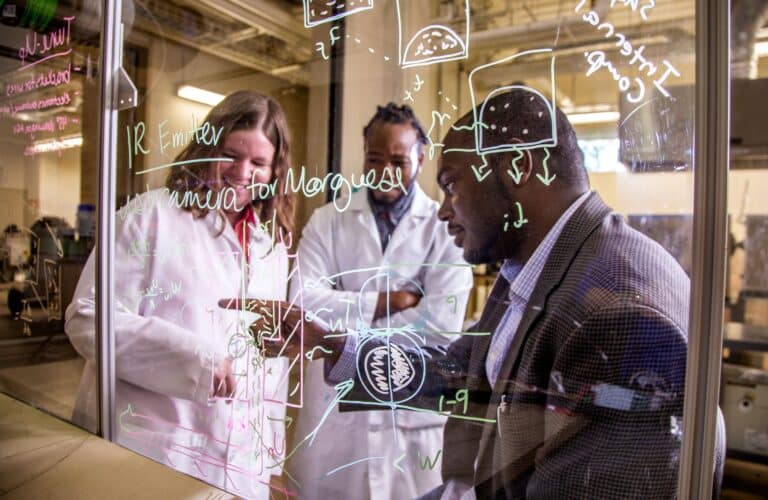
An advanced degree in engineering can greatly improve your career prospects. A master’s degree builds on your undergraduate education by zooming into one particular area of a wider subject. Whether you get a taught or research-based master’s degree, you gain a greater amount of specialist knowledge. With this, you can get a leg up in salary negotiations and open the door to more job opportunities.
If you’re aiming for a career in academia, a research master’s is the best pathway towards a PhD, a terminal degree that trains you to become an expert in your field while pursuing your passion. Most PhD graduates progress into teaching roles in academia, working towards becoming a tenured professor. Some PhD graduates work in industry, and if they come with real-world experience, they’re trusted as the ones most capable of handling the most cutting-edge tasks. Whichever path you choose, there are many benefits to earning a PhD in engineering — more so if your degree is from one of the top-ranked universities below:

Florida State University is a Tier 1 research university. In the US, universities with R1 status are institutions of higher education well known for their prolific research activity. Source: Florida State University College of Engineering
Florida State University
Florida State University ranks in the top 25 among national public universities, with 2024 being its fifth consecutive year, and named the #8 Best Value College in the nation among public colleges and universities according to US News & World Report’s “Best Colleges 2024” guidebook. “Best” is in the university’s DNA and its College of Engineering is no different. The college is shared with the other powerhouse university in Florida’s capital city – Florida A&M University — making it the only joint college of its kind. The FAMU-FSU College of Engineering is a collaboration that provides an unmatched engineering research ecosystem, converging several cutting-edge facilities in one place and bringing a seemingly unlimited list of opportunities to students.
And that includes graduate programs that prepare students for careers in industry and academia. The college offers seven PhD programs that’ll help you develop excellent research skills and become an expert in your field. These include chemical engineering, biomedical engineering, civil engineering, electrical engineering, mechanical engineering, materials science and engineering, and industrial engineering. The best part? You only need a bachelor’s degree to apply — prior research experience is a plus , but not necessary.
All programs are led by award-winning faculty members working in the hottest areas, using state-of-the-art facilities such as magnetic resonance imaging in the National High Magnetic Field Laboratory. Students have the opportunity to work in associated centers around the area, including the Applied Superconductivity Center and the High-Performance Materials Institute.
FSU’s doctoral engineering programs stand out even more with how they embed various state and federal projects into the curriculum. Students actively perform research work for organizations such as the US Department of Defense, US Department of Energy and more, gaining valuable insights that are crucial for academic and professional development. These experiences make an FSU PhD a valuable engineering education — apply to Florida State University and the FAMU-FSU College of Engineering today or get a no-obligation degree pathway consultation.

The University of Iowa has seven engineering PhD engineering programmes that are supported by six academic departments within the College of Engineering. Source: University of Iowa College of Engineering.
University of Iowa
The University of Iowa creates innovators and creators who forge ahead and push new boundaries in technology and engineering. Ranked #77 for Best Engineering Schools by US News & World Report 2022-2023, the College of Engineering offers PhD programs in biomedical engineering, chemical and biochemical engineering, civil and environmental engineering, electrical and computer engineering, industrial engineering, and mechanical engineering.
The university trains real engineers for the real world to solve real problems. The Seamans Center for the Engineering Arts and Sciences’s Lichtenberger Engineering Library, the Hanson Center for Technical Communication, full-service machine and electronic shops, student workspaces, computational facilities, and research laboratories — the many facilities show the university’s dedication to providing engineers a space to pursue their studies without the constraint of a lack of facilities.
The university also has its research and educational activities supported by four research centers and institutes: the Center for Bioinformatics and Computational Biology, the Iowa Institute for Biomedical Imaging, IIHR—Hydroscience and Engineering, and the Iowa Technology Institute.
Between those and programs like NEXUS that promote collaboration with the art community or the Leadership, Ethics, and Professional Pathways (LEaPP) Academy that equips students with the knowledge, skills, and perspectives that shape them into ethically and globally aware citizens of the world, the University of Iowa is ready to help engineers push themselves to the next level.

UC Riverside places in the top 20 for Best Public Global Universities for Engineering by US News & World Report 2022. Source: Bourns College of Engineering at UC Riverside.
University of California, Riverside
Among the top 1.3% of universities worldwide, UC Riverside shapes tomorrow’s leaders to find new ways of thinking, doing, and achieving to make a difference in an increasingly multicultural and interconnected global society. The university offers five engineering PhD programs, including bioengineering, chemical and environmental engineering, electrical and computer engineering, mechanical engineering, and materials science and engineering.
Each program comes with a broad list of research specialisations and boasts its share of student accomplishments. From not one, but two bioengineering students receiving a US$12,000 Koerner Family Foundation fellowship grant to cover their educational costs (a grant that only 20 doctoral engineers from across the nation receive) to a chemical and environmental engineering graduate co-inventing a materials science technology that was inspired by the “smasher” mantis shrimp and was recently used to develop a “bioinspired marvel,” high-performance, impact-resistant hockey equipment, UC Riverside plays a big part in helping guide students to these achievements.
As the only public research university in inland Southern California, UC Riverside is pioneering research with a local and global impact, contributing up to US$2.71 billion to the US economy. To help students play a part in this, students get access to cutting-edge facilities in 11 research centers and connections to world-renowned faculty in 60 broad research areas. Here, your ideas impact the world because it’s not just about answering problems – you’ll be part of global solutions.
*Some of the institutions featured in this article are commercial partners of Study International







